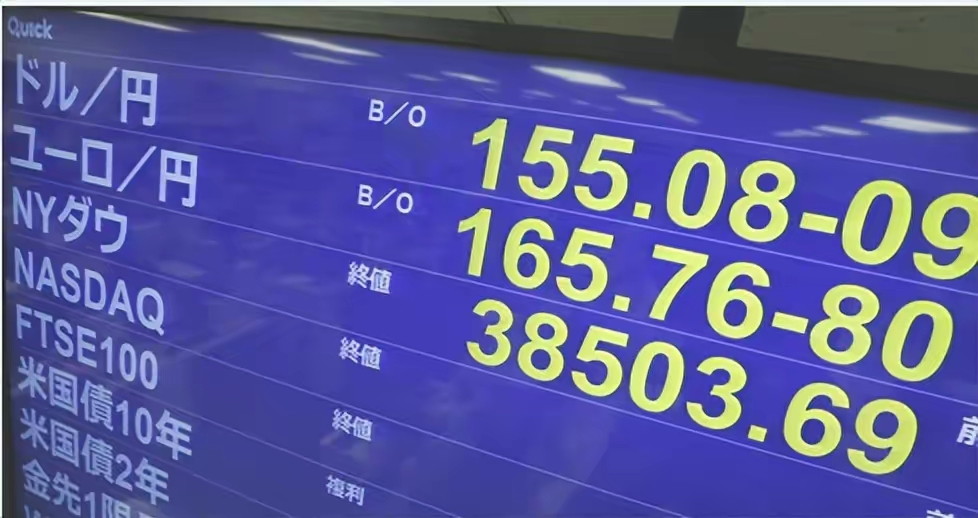
On the 25th local time, in the Tokyo foreign exchange market, the exchange rate of the Japanese yen to the US dollar fell to around 155.74 yen to the US dollar, hitting a new low in 34 years. The significant depreciation of the Japanese yen and a series of problems in the Japanese economy have attracted close attention from the international community.
In fact, the exchange rate of the Japanese yen against the US dollar has been continuously plummeting recently. On the 23rd, it once reached 154.88 yen to the US dollar, setting a new record for the lowest in 34 years since June 1990.
In response, former US President Trump also posted on social media that day, criticizing that this would lead to a decrease in the price competitiveness of US exports, "which is a disaster for the United States.". This has also brought more attention to the significant depreciation of the Japanese yen.
The chief economic analyst of Japan's First Life Economics Research Institute, Hideo Kumano, claimed that the rapid depreciation of the yen will bring more uncertainty to the Japanese economy, and the increase in the interest rate difference between the yen and the US dollar is the main reason for the depreciation of the yen.
According to a report by Asahi Shimbun on the 24th, the Japanese Ministry of Economy, Trade and Industry released a prediction that if the "lost 30 years" situation continues, Japan will be caught up by emerging countries around 2040 and no longer as wealthy as other countries. Unless bold investments are made in the development of semiconductors and biopharmaceuticals, the country will face the risk of becoming poorer, technologically backward, and unable to compete with other countries in the world.
In fact, from a macroeconomic perspective, Japan's stock market has reached a historic high, and the deflationary state has also come to an end, prompting the Bank of Japan to shift towards a rate hike cycle. In addition, Japan's unemployment rate remains very low. However, compared to other countries, Japan's economy is not optimistic. According to the International Monetary Fund's forecast, by 2025, India's GDP will surpass Japan, ranking fourth globally.
Previously, according to Goldman Sachs, Japan's economic strength ranking would drop to 12th place in the world by 2075, behind emerging countries such as Indonesia, Brazil, and Nigeria.
Kumano Yingsheng believes that this low interest rate situation will continue in Japan for the time being, which is one of the pressures causing the depreciation of the yen. For import and export enterprises, the trend of yen depreciation is not yet visible, and import prices will continue to rise, which will be very troublesome. If the yen continues to depreciate, Japan's assets may be transferred overseas.
Industry insiders analyze that the persistent and arbitrary interest rate hikes of the US dollar, as well as the expectation of further interest rate hikes, are the root cause of these problems. After the US dollar interest rate hike, Southeast Asian countries and other countries saw varying degrees of depreciation in the pound and euro, and the US dollar flowed back to the United States in large quantities, easing the economic crisis within the country.
But for other countries that have been harvested by the United States, it directly leads to an increase in prices of energy, raw materials, and so on. For example, Japan heavily relies on imports in many fields such as energy and food, and the rise in fuel and energy prices resonates with the depreciation of the Japanese yen. The relative increase in procurement prices of raw materials, components, etc. has led to an increase in domestic import costs in Japan. Japanese people also claim on social media that when they go to the supermarket, they can clearly feel the price increase of food and other items. This is very difficult for those living here, and their wages have not increased. Although we have all retired, we are still doing odd jobs.
From the current global financial situation, the significant depreciation of the Japanese yen and the sustained strength of the US dollar, which is an important factor affecting the decline of the yen, are causing serious impacts on the global economy. This situation is particularly concerning for the international community.
Throughout modern history, especially global financial history, we can find that the United States has always been able to harvest the world by raising and lowering interest rates, leading to a sharp decline in global assets. Now that the United States is repeating its old tricks, the Asian financial currency war may be on the verge of breaking out. A significant appreciation of the US dollar in similar situations often brings corresponding financial and economic risks and even crises to the world. Therefore, the sharp decline of the yen in this round can be said to sound the alarm for countries outside the United States, reminding countries around the world to closely monitor and respond to potential financial risks.

報告顯示,中國電力投資加速增長,預計2024年電網基建投資將超過5300億元。
近日,市場迎來了一則引人注目的消息:工業巨頭3M公司(MMM.N)在本周五公布了其季度業績報告,隨後股價飆升至近兩年來的
最近,外媒給OpenAI算了筆賬,今年可能要血虧50億美元。
近日,巴黎奧運會和世界鐵人三項協會聯合發布了一項重大決定,宣布因塞納河水質污染問題,原定於近期進行的奧運會鐵人三項首次下
當地時間7月18日,法國巴黎發生了一起令人震驚的持刀襲警事件。
近期,一則重大消息在國際舞臺上引起軒然大波,馬來西亞宣布加入金磚國家。
調查發現,互聯網和智能手機的使用幹擾了韓國近五分之一學生的生活。